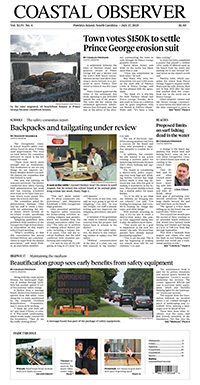Safety
School threats bring call for more action

As the number of reports of threats at schools grows, one Georgetown County School Board member is demanding action to keep students safe.
“You can’t put a value on a child’s life,” Board Member Robert Cox said. “I’m not putting a $99 million budget on a child’s life. We need to look at security in our school system in Georgetown County immediately.”
Waiting for something to happen before upgrading security is too late, Cox added.
“We need to be proactive,” he said. “We don’t want to wait until a child loses their life in Georgetown County to say ‘I wish we would have looked at costs.’ ”
The district deploys traditional metal detectors and weapon detection systems at all high schools and middle schools, but not every day.
Alan Walters, the district’s director of safety and risk management, said metal detectors don’t screen bags. Weapon detection systems use artificial intelligence to screen people and bags for weapons.
When using the metal detectors, staff members have to check every bag. It’s not like the screening machines at an airport, Walters said.
“The bag search is probably the most labor intensive. Searching that bag and doing it correctly takes time,” Walters added. “If we’re going to do it, we need to do it right and do it thoroughly.”
On days when detectors are in use, schools keep staff members outside the door to make sure students aren’t disposing of weapons.
“It’s a deterrent,” Walters said. “The value is not a 100 percent, absolute way to keep things from getting into schools. I think if there was, everybody would be doing it.”
The last time the detectors were in place at Waccamaw High School, the last student passed through at around 8:40 a.m. First block begins at 8:30.
Cox called on the board to form a committee to study ways to keep students and staff members safe.
“What happens on a day that we don’t [use] a weapons detection system and a student brings a gun to school?” Cox said. “I don’t think we’re doing enough. … It’s time that we take this seriously.”
On Thursday, Andrews High School was evacuated after a bomb threat was called in. Extra deputies were sent to protect the students as they were moved to Rosemary Middle School.
Two dogs were brought in to search for explosives. None were found, but the students were sent home at noon.
Last week, a 13-year-old Coastal Montessori Charter School student told a classmate he would warn him when to stay home because he was going to “bomb the school,” according to the sheriff’s office. The classmate told the deputy that the suspect had created video games where a person could shoot kids or shoot guns in a hallway of a school.
Another student reported that during a conversation about water guns, the suspect said “well I have a real gun.”
The deputy’s report did not say whether any action was taken against the suspect.
It was the second incident of a threat at the charter school since the start of the school year.
On Aug. 4, a third-grader threatened to shoot an 11-year-old classmate.
According to the police report, the younger boy didn’t have a gun or access to a gun, but pulled out a plastic knife that he got from the cafeteria.
No charges were filed but the boy was suspended from school for five days.
Walters said one of the reasons why there are more students threats reported is because South Carolina law was changed in 2018. Since then, only non-students can be charged with “disturbing schools.”
“That made an important distinction,” Walters said.
In 2021, a federal court also ruled that school students can’t be charged with disorderly conduct.
“They said that was too vague to use,” Walters said. “It doesn’t describe what the behavior was that made it disorderly and how it disrupted the school environment.”
Students are now charged with “student threats,” which states: “it is unlawful for a student of a school or college in this State to make threats to take the life of or to inflict bodily harm upon another by using any form of communication.”
“Any threat … whether it is realistic or not, is a violation of state law,” Walters said.
Last month, shots were fired at Georgetown High School during halftime of a football game. Since then, the district has tightened security at football games.
Changes include: enforcement of a clear bag policy and increased screenings of attendees; increased law enforcement presence; high school students must show a school ID to be at the game without an adult; students in kindergarten through eighth grade must be accompanied at all times by someone who is at least 21 years old; anyone who leaves a stadium must buy a ticket to return; no entrance after halftime; and concession stands will close at the end of the third quarter.
Walters said in many cases parents buy a ticket for themselves and their children, escort the children into a stadium, and then leave and return to pick them up later.
“We’re trying to monitor that more closely,” he added.
Update: This story was updated from the print version to include the bomb threat at Andrews High.




